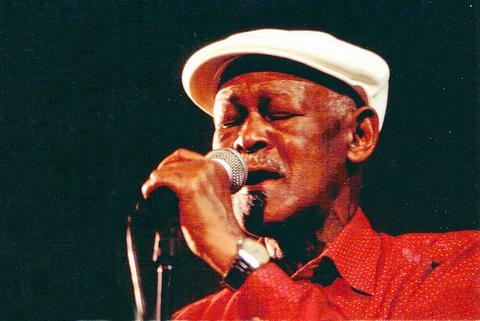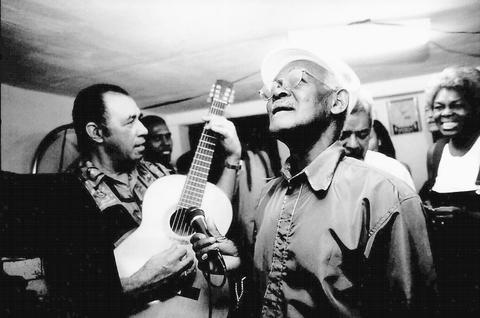Ibrahim Ferrer is what many would call a living legend. He grew up on the streets, sang with Cuba's famous big bands in the 1950s and made a mark on the country music scene, but fame and money eluded him. Retired at the age of 70, he went back on the streets again, shining shoes and selling lottery tickets. When music producer Ry Cooder re-discovered him, he was taken to the studio and brought his shoe-cleaning cloth with him.
With the launch of his second musical career, Ferrer became the front man for the Buena Vista Social Club (BVSC), a group which gained international recognition and sold 5 million albums. Ibrahim Ferrer's debut album has sold 1.5 million copies to date and with it he won the "best new-comer" award -- aged 73 -- at the Latin Grammy Awards. On Sept. 3, his Buena Hermanos won the "Best Traditional Tropical" category award at the fourth Annual Latin Grammy Awards.

PHOTO COURTESY OF TREE MUSIC
To many Taiwanese fans' disappointment, Ibrahim Ferrer has canceled his Asia tour, the seven concerts in South Korea, Taiwan, Hong Kong and Japan, because of health reasons. DaDa Arts, the promoter of the concert, said the singer's Taipei concerts may be put off until next year because of his health condition and full schedule.

PHOTO COURTESY OF TREE MUSIC
Unlucky once again, Taiwan misses yet another Cuban performance. Last year, another Cuban group Vocal Sampling could not make the trip because of visa
problems. Another band Cubanissimo almost could not make it also because of visa difficulties. Two years ago, Omara Portuondo, another member from BVSC, was invited for a concert in Taipei, but canceled because of personal reasons.
The Taipei Times, however, managed to find Ferrer when he was touring in Barcelona in Spain, a week before he fell ill and returned to Havana. In an exclusive interview he talked about finding success late in life, and losing his companions in the BVSC. He also revealed [take a closer look at his picture now] that he has Chinese ancestry.
Taipei Times: Now that you and Omara Portuondo [singer and the only female member of BVSC] have been developing your own solo careers, the BVSC "dream team" no longer exists. Do you still keep in contact with Omara? Will there be a chance that you will be performing together again?
Ferrer: Of course, I will never lose contact with Omara. We have a very strong and solid friendship and companionship. Omara is now recording in Cuba. We now have our own bands. So if we can sing together or not is a matter for our managers.
TT: Compay Segundo passed away a few months ago. What are your feelings about losing your musical companion?
Ferrer: I knew about it when I was in Europe. Well, I was in deepest grief. He was a friend and companion the whole of my life.
TT: How do you feel about the way fame came to you late in life?
Ferrer: I see all this as happening naturally. I'm a very natural person. I've been like this ever since I was a child. Whatever happens, I just take it as it is. Many things just happen. There's no reason why. And as for fame or self-inflation, what would I want that for? If I wanted that, it would not be the original Ibrahim Ferrer. It would be another person.
TT: After becoming famous, what has changed in your life?
Ferrer: I have quit smoking. I can't smoke any more for health reasons. Today, the reason I can talk to you on the phone is because I quit. I still drink rum, but just a little bit every day. And of course traveling, memories and souvenir collecting are great fun. I have so many things that I can share with my family now. These [memories] are what makes life different, more important than pride. At the end of the day none of us can escape death. Illusions like pride and vanity are nothing. Another change is that I can now help more friends and relatives. And I can introduce my wife to everybody. All the rest [material things] doesn't matter.
Taipei Times: The last time you toured Asia was three years ago. What was your impression of audiences in Asia?
Ferrer: I've told my manager that it's a pity that I cannot sing in [Chinese]. I really want to learn, even if it's just to hum a melody it would be great. And of course I love Chinese food, although sometimes I confuse Chinese food, or Taiwanese food with Japanese food. But I've always felt connected with anything Chinese. Let me tell you a secret. In fact my great grandmother on my mom's side is Chinese. So I have Chinese blood! If you have a photo of me, you can tell that I have some Chinese facial features.
TT: How did you make traditional Cuban ballads sound so different, deeper and more flavored? Is there any secret to your singing? And how do you take care of your voice and throat?
Ferrer: Everybody asks me the same question. I don't know. I don't think of myself as so good at singing. All I know is that I was born at a ballroom dance party. My mom's [waters broke] and I was born in the ballroom. I never learned [formally] how to sing. I sing naturally. This is why I cannot teach people how to sing, because I never trained professionally. I grew up and learned my living on the streets. I learned things there, too. So I don't know what's the secret about my voice. I now have my hand on my heart, although you can't see it, to show you that I'm not lying. I was once told that I wasn't suited for singing. So I've never taken care of my voice and throat. If I knew what I was to become today, I would have taken care of it.
TT: What does music or singing mean to you?
Ferrer: That is my life, it is life itself. I've always thought that this was to do with the fact that I was born in a ballroom.
TT: For young people who love music, what advice would you give them?
Ferrer: If you have a chance to learn, you should take the chance and go ahead. I lost my parents at the age of 12. I have taken all kinds of different jobs for a living, until today. So I hope that young people can pass down to an even younger generation their love of music. Also, don't smoke and just drink a little bit. You should try everything in your life.

“Why does Taiwan identity decline?”a group of researchers lead by University of Nevada political scientist Austin Wang (王宏恩) asked in a recent paper. After all, it is not difficult to explain the rise in Taiwanese identity after the early 1990s. But no model predicted its decline during the 2016-2018 period, they say. After testing various alternative explanations, Wang et al argue that the fall-off in Taiwanese identity during that period is related to voter hedging based on the performance of the Democratic Progressive Party (DPP). Since the DPP is perceived as the guardian of Taiwan identity, when it performs well,

The Taiwan People’s Party (TPP) on May 18 held a rally in Taichung to mark the anniversary of President William Lai’s (賴清德) inauguration on May 20. The title of the rally could be loosely translated to “May 18 recall fraudulent goods” (518退貨ㄌㄨㄚˋ!). Unlike in English, where the terms are the same, “recall” (退貨) in this context refers to product recalls due to damaged, defective or fraudulent merchandise, not the political recalls (罷免) currently dominating the headlines. I attended the rally to determine if the impression was correct that the TPP under party Chairman Huang Kuo-Chang (黃國昌) had little of a

At Computex 2025, Nvidia CEO Jensen Huang (黃仁勳) urged the government to subsidize AI. “All schools in Taiwan must integrate AI into their curricula,” he declared. A few months earlier, he said, “If I were a student today, I’d immediately start using tools like ChatGPT, Gemini Pro and Grok to learn, write and accelerate my thinking.” Huang sees the AI-bullet train leaving the station. And as one of its drivers, he’s worried about youth not getting on board — bad for their careers, and bad for his workforce. As a semiconductor supply-chain powerhouse and AI hub wannabe, Taiwan is seeing

Jade Mountain (玉山) — Taiwan’s highest peak — is the ultimate goal for those attempting a through-hike of the Mountains to Sea National Greenway (山海圳國家綠道), and that’s precisely where we’re headed in this final installment of a quartet of articles covering the Greenway. Picking up the trail at the Tsou tribal villages of Dabang and Tefuye, it’s worth stocking up on provisions before setting off, since — aside from the scant offerings available on the mountain’s Dongpu Lodge (東埔山莊) and Paiyun Lodge’s (排雲山莊) meal service — there’s nowhere to get food from here on out. TEFUYE HISTORIC TRAIL The journey recommences with